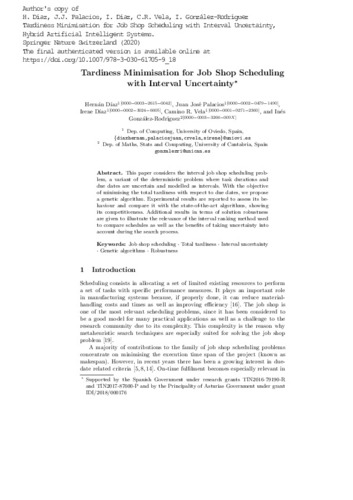Tardiness Minimisation for Job Shop Scheduling with Interval Uncertainty
Palabra(s) clave:
Job Shop Scheduling
Total tardiness
Interval uncertainty
Genetic algorithms
Robustness
Optimization, systems theory
Computer science
Manufacturing engineering
Fecha de publicación:
Versión del editor:
Serie:
Lecture Notes in Computer Science;12344
Descripción física:
Resumen:
This paper considers the interval job shop scheduling problem, a variant of the deterministic problem where task durations and due dates are uncertain and modelled as intervals. With the objective of minimising the total tardiness with respect to due dates, we propose a genetic algorithm. Experimental results are reported to assess its behaviour and compare it with the state-of-the-art algorithms, showing its competitiveness. Additional results in terms of solution robustness are given to illustrate the relevance of the interval ranking method used to compare schedules as well as the benefits of taking uncertainty into account during the search process.
This paper considers the interval job shop scheduling problem, a variant of the deterministic problem where task durations and due dates are uncertain and modelled as intervals. With the objective of minimising the total tardiness with respect to due dates, we propose a genetic algorithm. Experimental results are reported to assess its behaviour and compare it with the state-of-the-art algorithms, showing its competitiveness. Additional results in terms of solution robustness are given to illustrate the relevance of the interval ranking method used to compare schedules as well as the benefits of taking uncertainty into account during the search process.
Descripción:
International Conference Hybrid Artificial Intelligent Systems. HAIS 2020 (15th. 2020. Gijón, Spain)
ISBN:
Patrocinado por:
Supported by the Spanish Government under research grants TIN2016-79190-R and TIN2017-87600-P and by the Principality of Asturias Government under grant IDI/2018/000176.
Colecciones
- Informática [857]
- Investigaciones y Documentos OpenAIRE [8189]
- Ponencias, Discursos y Conferencias [4140]
Ficheros en el ítem




